|
Have you ever boldly proclaimed Christ, only to fail Him later? Have you ever felt confused, broken or lost in your faith journey? Have you ever just wanted to go into hiding? Are there wounds deep in your soul that need the healing touch of Jesus? Have you ever wondered how Jesus could use a flawed sinner like you for any good in the kingdom? In my own faith journey through the years, my answer would be yes to all of these questions. I imagine many of you would say the same. There is another who also struggled with his failure, his flaws in his humanity and his passionate desire to serve his Lord. His name is Simon Peter. This teaching covers many verses, so I encourage you to give it some time to really soak in. I've divided it into two parts for those of you that might choose to read it in sections. The important thing is not to rush how the Lord wants to speak into your life through one of the most wonderful chapters in Scripture. For our last blog of the feast series we are going to study the last feast that Jesus shared with Simon Peter and his disciples on earth. John 21 is an intimate scene with the Savior that takes place after Jesus has been crucified and resurrected. This encounter holds beautiful truths for those of us who long to be faithful followers of Christ. Part 1 Jesus has told the disciples to go to the mountain at the sea of Galilee and wait, however in John 21 we see that seven of them have gone fishing. We don’t know if they are just hungry or if they are, in essence, returning to their old way of making a living. But the group is the familiar inner circle with Peter and Nathanael, James and John, Philip and Andrew. Thomas the doubter is thrown in and we can only assume that doubting Thomas wasn’t going to be left out again! The disciples had left everything and followed Jesus…. and there were three years of powerful ministry as they answered this call of Jesus on their lives. There were amazing miracles, healings, incredible teachings, heavenly visions, and through it all Jesus and the disciples faced great opposition. Then they saw Jesus, their Messiah die on the cross, and when it seemed all hope was gone, Jesus appeared to them twice risen from the grave. And now they wait for His coming to them again…. and this is what happens. John 21:1-14 (NIV) 1 Afterward Jesus appeared again to his disciples, by the Sea of Galilee. It happened this way: 2 Simon Peter, Thomas (also known as Didymus), Nathanael from Cana in Galilee, the sons of Zebedee, and two other disciples were together. 3 “I’m going out to fish,” Simon Peter told them, and they said, “We’ll go with you.” So they went out and got into the boat, but that night they caught nothing. 4 Early in the morning, Jesus stood on the shore, but the disciples did not realize that it was Jesus. 5 He called out to them, “Friends, haven’t you any fish?” “No,” they answered. 6 He said, “Throw your net on the right side of the boat and you will find some.” When they did, they were unable to haul the net in because of the large number of fish. 7 Then the disciple whom Jesus loved said to Peter, “It is the Lord!” As soon as Simon Peter heard him say, “It is the Lord,” he wrapped his outer garment around him (for he had taken it off) and jumped into the water. 8 The other disciples followed in the boat, towing the net full of fish, for they were not far from shore, about a hundred yards. 9 When they landed, they saw a fire of burning coals there with fish on it, and some bread. 10 Jesus said to them, “Bring some of the fish you have just caught.” 11 So Simon Peter climbed back into the boat and dragged the net ashore. It was full of large fish, 153, but even with so many the net was not torn. 12 Jesus said to them, “Come and have breakfast.” None of the disciples dared ask him, “Who are you?” They knew it was the Lord. 13 Jesus came, took the bread and gave it to them, and did the same with the fish. 14 This was now the third time Jesus appeared to his disciples after he was raised from the dead. In our other studies in this series, Jesus has been fed a feast, as an invited guest, but here He is the one cooking the feast for his disciples. The future is uncertain. Jesus, their Savior is risen from the dead and has appeared and then disappeared again just as quickly out of their lives. This is the third time that Jesus was manifested to the disciples, after He was raised from the dead, (meaning He appeared suddenly in glorified form). It is sometime between the 8th day and the 40th day when He ascended into heaven. 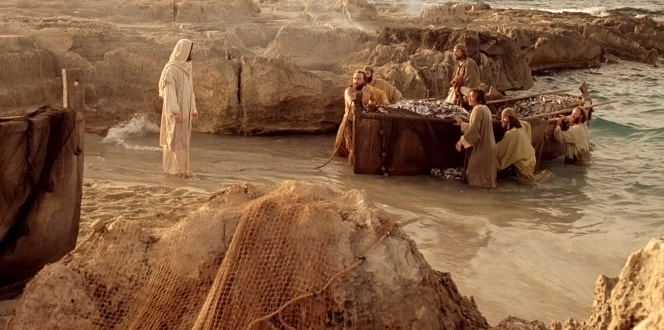 He miraculously appears through locked doors and they know it is Jesus, but don’t seem to fully know. Mary recognizes his voice but initially thinks He is the gardener. The disciples on the Emmaus road talk with him for hours, but don’t recognize him until He breaks bread, then to vanish again. The way they recognize Him is by the wounds in His hands and feet. This time, on the shores of the sea of Galilee, they recognize it is the Lord, not by what they can see from the boat only 100 yards away, but from what He tells them to do. Haven’t caught any fish have you? (They’ve been fishing all night.) Perhaps John recognizes His voice when He says, “Cast the nets on the other side.” It is a familiar part of their story with Jesus. John knows and then Peter knows. It’s Jesus! They recognize Him now because of the first miraculous catch of fish when He told them to put down their nets after they had already been fishing all night and not caught any fish. And even though they are so close to shore Peter simply cannot wait to get to Jesus, so he throws on his fisherman’s coat and dives into the cold water. This time there is no boldly asking Jesus if he might walk on the water. He just wants to get to Him as fast as he can. His response is so typically, wonderfully Peter! Now just try to imagine the scene.... Smell the sea, taste the fish and bread on the hot coals, hear the sounds of excitement as Peter jumps in, swims to shore, and rushes to embrace Jesus, splashing water all over Him. I imagine Jesus probably laughing, with His arms open wide to receive his friend. Meanwhile, the other disciples are doing their best to gather all the fish in the nets and get to shore. They arrive and Jesus invites them to bring some of the fish to join in with the breakfast that He is cooking for them, adding the fish they have caught to the fire. The risen Lord of the universe is cooking fish for the disciples on the hot coals! Then Peter drags the net to shore all by himself. That man was strong! He pulls in 153 large fish, probably about two pounds each. So he is pulling in at least 300 pounds of fish and the net is not torn. Isn't it amazing that they stopped to actually count the fish and that God gives us that detail! Then just picture them greeting Jesus on the shore. Can you see it in your minds eye? Imagine the joy! They know it is the Lord, but remember He is in His glorified form. The risen Savior has come to serve them His farewell meal of bread and fish. But there is much more to this story. I want us to look at the relationship specifically of Peter and Jesus. I love Peter. I relate to Peter. I think we all do in some way. He is referred to almost 200 times in the New Testament. Just as a comparison, John is referred to 31 times. Peter is a complex, strong leader, a simple fisherman, chosen apostle, yet flawed and sinful. He’s passionate, outspoken, impetuous and rash, bold in proclaiming who Jesus is, then hiding, confused, broken and humbled. Peter is utterly defined by what the love of Jesus brought forth in him. What did Jesus see in Peter? John 1:42 “Then Andrew took Simon to Jesus. Jesus looked at him and said, "Your name is Simon son of John, but you will be called Cephas." (This is the same as Peter and means "a rock.”) When later Peter declared Jesus, as the Messiah in Matthew 16, Jesus says, “But what about you? Who do you say I am?” 16 Simon Peter answered, “You are the Messiah, the Son of the living God.” 17 Jesus replied, “Blessed are you, Simon son of Jonah, for this was not revealed to you by flesh and blood, but by my Father in heaven. 18 And I tell you that you are Peter, and on this rock I will build my church, and the gates of Hades will not overcome it.” Jesus gazes into the eyes and heart of Peter and says, “Upon this rock I will build.” He is not describing who Peter is, but who he will become because of his faith and love for Christ. Peter always appears first in the listing of disciples. His deep and close friendship with Jesus is clearly portrayed in the gospels and Jesus often specifically names Peter. At the crucifixion Peter is fragile, yet he will emerge as the Rock, the foundational leader of the church of which Jesus is the chief cornerstone. Peter emerges as the one who fearlessly proclaims the risen Christ in the power of the Holy Spirit, and who is ultimately martyred for his faith. But what happens to make that difference in his life? What are the lessons we can learn for our own lives from the last encounter Jesus has with Peter in the last gospel, in the last chapter of John? This next scene in John 21 gives us the final lesson that Jesus specifically teaches Peter before he ascends to heaven. It is the turning point in Peter’s life and ministry that I believe enables him to move into his position of leadership in the church. The story continues.... Part 2 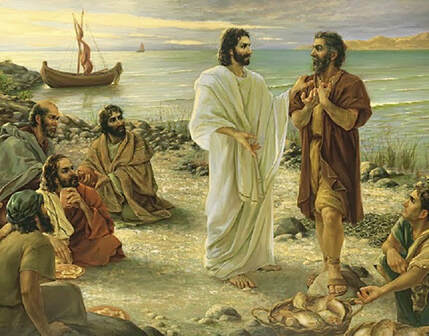 John 21:15-19 15 When they had finished eating, Jesus said to Simon Peter, “Simon son of John, do you love me more than these?” “Yes, Lord,” he said, “you know that I love you.” Jesus said, “Feed my lambs.” 16 Again Jesus said, “Simon son of John, do you love me?” He answered, “Yes, Lord, you know that I love you.” Jesus said, “Take care of my sheep.” 17 The third time he said to him, “Simon son of John, do you love me?” Peter was hurt because Jesus asked him the third time, “Do you love me?” He said, “Lord, you know all things; you know that I love you.” Jesus said, “Feed my sheep. 18 Very truly I tell you, when you were younger you dressed yourself and went where you wanted; but when you are old you will stretch out your hands, and someone else will dress you and lead you where you do not want to go.” 19 Jesus said this to indicate the kind of death by which Peter would glorify God. Then he said to him, “Follow me!” It’s hard to imagine sinking lower than Peter was at the beginning of this story. He had proclaimed publicly that his intentions were to die for Christ if needed. He had spoken so boldly about how he would never forsake Christ, even if others did. He had even tried to defend Christ when the mob came to the garden of Gethsemane, drawing his sword to fight off possibly 100 men or more. He had followed Christ after his arrest. But when the slave girl questions him, he denies Christ, as he warms himself by the fire in the courtyard outside the palace of the high priest, Annas, where Jesus was being interrogated. In fact, he denies Christ three times that night and then when the rooster crows at the third denial, as predicted by Jesus, his eyes meet the Savior and he flees the scene and weeps bitterly. Jesus appears to Peter again where it all began, on the shore of Galilee. It was at this same sea of Galilee that Jesus had said they would be fishers of men. The setting had to remind Peter of his original calling with Jesus. Jesus had come to have a very specific conversation with Simon Peter. Nothing is coincidence with Jesus. This is all very intentional. And then Jesus asks Peter after breakfast on that morning, “Do you love me more than these?” Jesus always called Peter Simon because he had not yet become Cephas - the rock. Peter, the rock, was a prophetic name given to him by Jesus.  Jesus has come to restore and reinstate Peter. Peter needs to be reinstated and affirmed in his calling because of his failure and denial of Christ three times after Jesus’ arrest. Peter’s denial of Christ took place next to a fire. It was a place of failure and despair for him. So Jesus asks him three times if he loves Him, not to condemn him, but to give him a chance to openly confess his love. Do you see how the similarities in his denials and this conversation are so beautifully orchestrated by Jesus? And now Peter’s calling is affirmed and he is restored next to a fire on the shores of the sea of Galilee, the same sea where he first answered the call to be a disciple. Jesus uses the word agapao in the Greek when he asks Peter about his love. It means to the fullest extent, noble and pure. Peter responds with the word phileo which is the word for brotherly love in the Greek. There has been much made of this response in teaching I have heard in the past, but they probably weren’t speaking Greek anyway and Peter’s word is the same one used in John 5:20 when Jesus talks about the Father’s love for him, so it couldn’t be an inferior love. Some commentators say that it was simply a stylistic choice by John as he frequently changed up words in his writings. The point is that Jesus is asking Peter to affirm his love for Him. He doesn’t ask him, “Will you serve me?” or "Do you have faith in Me?” Those would have been legitimate questions for faith serves as the foundation of our relationship to Jesus Christ. But faith is the foundation, and love is the evidence. In the Aramaic the word for love is hooba which is taken from a root word that means to set on fire. In other words, Jesus would have been asking Peter, “ Do you burn with love for me?” Our love for Jesus must be passionate and kindle a holy flame within our hearts. The Scriptures tell us that Peter is penitent. He had great remorse for his betrayal and wept bitterly. But Christ cannot commend his flock to those who are only repentant. It is only deep love for the Savior, love above all else, that will sustain his calling and ours. Jesus says, "Do you love me more than these?" What does “these” refer to? It could be fishing, his old way of life, either for the pleasure of it or material gain of it, but is most likely referring to the disciples. Do you love me more than your close friends love me? Remember Peter had rashly declared, “Though all deny you, I will never deny you.” And now he will not claim that he loves more than the others. He replies simply, “You know that I love you, you know that I love you, you know all things, you know that I love you.” Peter calls Christ himself in His omniscience to be the witness of His love. Peter must face up to the reality of his sin. It is a time of intense pain. But sometimes wounds must be reopened to be healed. Michael Card writes in his wonderful book on the life of Peter entitled, The Fragile Stone, ”His painful questions are meant to restore Peter to his proper place. Painful as the questions are, they are an expression of Jesus’ creative forgiveness. Jesus’ questions open a wound in Peter’s soul, a wound that can be tended to and healed only by being reopened. The forgiveness Jesus has commanded them to offer has been offered to them and it empowers Peter. Now he understands that his position of leadership is founded not on his strength but on his brokenness. Jesus had said of the woman, “I tell you your sins and they are many have been forgiven, so she can show me much love. But a person who is forgiven little shows only little love.” (Luke 7:47) If that was still true, then Peter's love must be the greatest because he is been forgiven of the greatest sin. Even in this Peter ranks first among the disciples. Once it is firmly established in his heart, he will be fit to lead them.” Each time Peter responds to Jesus’ question of his love, Jesus instructs Peter. Feed My lambs. Tend or Shepherd My sheep. Feed My Sheep  Our tablescape for our final Feast Table! Our tablescape for our final Feast Table! His first call is to become a fisher of men. Now comes the call is to be a Shepherd and it will be one of the themes in the writings of Peter in Scripture. And finally when he says, “Follow Me” the healing is complete.The offer that Jesus had given Peter three years before to follow Him still stands, despite his failure. Jesus is the great pursuer of the fallen. He has been the dearest of friends to Peter - forgiving him when he failed, healing a painful memory, loving and believing in Peter and dying for Him. And what will be the result of this farewell breakfast of fish, forgiveness and restoration? The new calling is clear. For the remainder of Peter’s life he will be the primary earthly shepherd for this flock of frightened new believers. He will risk his life for them, care for them and powerfully preach by the Holy Spirit the truth, feeding them God’s Word. He will become the shepherd who feeds them Jesus. The coals on the fire become a flame in the heart of Peter. Within seven weeks Peter will preach the boldest sermon of his life in Jerusalem and 3000 will be saved and the nucleus of the church will be established there. He becomes the rock Jesus prophesied he would become through the power of the Holy Spirit, forgiveness, grace, mercy and love of the Savior. That is what and who defines him. That is what the love of Christ and for Christ can bring forth. Later, Peter will be crucified for his faith as Jesus had told him he would die - stretched out on a cross - and history tells us he requested to be crucified upside down. Ultimately Peter dies for his friend and Savior, Jesus, who first died for him, who paid the price for his sin. But this is so much more than an incredible story about Peter and Jesus. It's a story of the Savior's pursuing love for you and for me. Jesus wants to heal your wounds and forgive your failures as well. They do not need to disqualify you from answering Jesus’ call to serve Him. His heart is always for restoration. There is power in love and forgiveness. It is never too late! Are there painful memories in your mind that need to be healed by the love of Jesus? Many of us can identify with Peter over our own sense of spiritual faltering and failing. How many of us have resolved to be faithful, only to have fallen into sin, spiritual coldness, and barrenness? How often have we done the very thing we said that we would not do in terms of spiritual commitment? It is easy to get discouraged when we look at our lives. But our hope does not rest solely in our love for Christ - but in His love for us. Jesus is the great pursuer in this passage. He is in the business of restoring His children, His friends, His beloved. Maybe you too need to find an intimate moment with Jesus and confirm your love for Him and find rest for your soul and healing in His forgiveness. Jesus sees all. He is omniscient as Peter said to Him - You know what’s in my heart. You know I love you. Of course Jesus knew, but Peter needed to affirm it to heal the wound. Nothing is hidden from Him: not your motives, not your desires or your affections. He sees all and calls for your response. Do you love Him? Even with your failures, even in your sin, is there still that truest sense of love for Jesus Christ in the depths of your soul? We cannot look at the Bible studies or Sunday school classes we have attended or taught, our service in the church or community, the money we have given or the people we have helped. We must only stand on the merit of His grace in our hearts and His great love and mercy for us. Jesus’ love for me and you is not rooted in our performance. It is settled at the cross and in our hearts. We love Him because He first loved us. To realize that love for Christ is in our hearts is to rekindle the assurance that we are His and He is ours. And the response of Christ to us as well is “Follow Me!” How do we follow Christ? First, following Christ is an attitude of devotion and true affection which is set upon the Person of Jesus Christ. We know we are following Christ when we have a desire to know Him more intimately and we make choices for our lives that reflect that heart of devotion. When we long for His presence, seek Him in worship and prayer and ask HIm for direction in our lives we are following Christ. Secondly, we can’t really know how to follow Christ unless we are spending time in the Word of God reading, studying, and hearing the Word. "If you love Me," Jesus stated, "you will keep My commandments" (John 14:15). When we spend time with Jesus in His Word, we know His commands and how to live them out in service to the Lord. Our service must come from a root of deep love for Jesus. Peter’s failure in his denial did not disqualify him from service for the kingdom of God and the same is true for us. When we have been zealous in our words that we’re going to live and fight for Christ and failed him or when we have become complacent in our walk with Jesus, it does not disqualify us from serving and from the work of the kingdom. Like Peter, we are not defined by who we are or what we have done, but by who we can become through the love, forgiveness, grace and power of Jesus Christ living within us. That is why He died on the cross. He is the great forgiver. He sent His Spirit to enable us to be who He created us to be. Like Peter, we need to run into His loving arms when we have failed Him and every day of our lives. The One who pursued Peter in love and restoration also pursues you. As we close this beautiful story I want to leave you with a few questions to ponder in the days ahead.
Remember, when Jesus gazes into your heart, just like Peter, He sees who you will become. Perseverance in the faith isn’t simply left to us. When God truly has started the work, He will finish it (Phiiippians 1:6). If Jesus has made us his own, He will be faithful to keep us till the end (1 Thessalonians 5:24; Hebrews 10:23). I want to close out this teaching with a song that has ministered to me greatly in recent years. It is based on Psalm 139:8-10 and has spoken to my heart as I’ve wrestled with God’s purpose and future for my own life and ministry. This Scripture has carried me as I’ve struggled with loss and disappointments in this season of my life. Please listen to the link below. There is no safer or more beautiful place to be in the universe than hidden with Jesus in the heart of God’s delight. We can rest secure in His purpose and love for us when we are settled in our love for Christ through our salvation. There is One who knows the depths of your heart and has a beautiful purpose for your life no matter what pain, failure or uncertainty you may feel. There is One who offers forgiveness, restoration and hope in your story. His name is Jesus. He is the Feast for your Soul! He will hold you fast and secure in His love and grace. Grateful that Jesus is the feast of my soul, Kathy It has been our great joy and privilege to share this "Feast for your Soul" devotional series with you over the last few months, Thanks you for feasting with us in the Scriptures! In the words of Peter, “Like newborn infants, long for the pure spiritual milk, that by it you may grow up into salvation — if indeed you have tasted that the Lord is good.” 1 Peter 2:2-3 May we crave God's Word and find our greatest delight in Jesus so that we grow into spiritual maturity, nourished and defined by His love so that we may become all that Jesus sees within us! Kathy and Sherry Resources: Michael Card, The Fragile Stone; Ken Gire, Moments with the Savior, teaching by John McArthur, Precept Austin, Phil Newton, Pinterest photos, LDS Media Library  If you are reading this blog through social media we would suggest that you sign up to recieve the blog each week in your email inbox. It will come directly to you to read at your leisure. Just enter your email in the subscriber box on the right at the top of this blog page on the website, then REPLY to the invitation email you will receive in your personal inbox. Your email address is safe with us! Follow ALL directions to completion! Feel free to share our blogs on your social media or email them to a friend.Just follow the instructions carefully.
1 Comment
 If you've been keeping up with us over the past few months, you will know that we have been blogging our teaching from the home Bible Study Series we created entitled, A Feast for Your Soul. Each lesson is centered around the lessons that Jesus taught as he attended various feasts in the New Testament. Today's Musing is taken from Luke 14: 1-24 which doesn't contain warm hospitality or friendly conversations! It is filled with self-interests, rebukes, and tension. This story takes place during a feast at the house of a ruler of the Pharisees. Jesus takes the opportunity to speak boldly to the Lawyers & Pharisees, the Honored Guests, the Host of the feast, and to a Guest who tries to make everyone a little more comfortable! As I attempt to go through this extensive passage, the outline will consist of 4 brief sections and end with the parable of the Great Banquet and the 3 men who insulted the host with their excuses! Today's study is not for the faint of heart! Plan to invest some time into todays devotion. Enjoy Feasting at His Table! Introduction: What is a Parable? A Parable is a story with 2 levels of meaning where certain details in the story represent something else. Stories such as these are easily remembered, the characters bold, and the symbolism rich in meaning. Parables were a common form of teaching in Judaism anda common cultural form of communication. Though the religious leaders regularly resorted to quoting one another or used academic language, Jesus spoke in the storytelling format already familiar to His culture. In doing so, He connected with His audience in a way the religious leaders did not, both touching personal needs and communicating spiritual truth. Why did He teach in parables? One of Jesus’ favorite literary techniques! It was common in the 1st century to speak with stories and riddles. When the disciples of Jesus asked Him why He spoke in parables, He answered, "To you it has been given to know the secrets of the kingdom of heaven, but to them it has not been given. For to the one who has, more will be given, and he will have an abundance, but from the one who has not, even what he has will be taken away. This is why I speak to them in parables, because seeing they do not see, and hearing they do not hear, nor do they understand" (Matthew 13:11-13). The Invitation Banquets were feasting social events. Jesus was invited to dine by the Leader of the Pharisees. Little did the host know what was about to happen at this event! A banquet given by a Pharisee and hosting a famous teacher was one of the ways he showed his “more holy than thou” attitude along with a prideful exhibition of his social status. The New International Dictionary of the Bible & Unger’s Bible Dictionary says this about Banquets: The Hebrews, like other peoples of the ancient East, were very fond of social feasting. Besides religious observance of the great festivals, families feasted on birthdays, funerals, marriages, laying of foundations, and sheep shearing as well as other occasions. Not much different than our special events – but the process and what was entailed is rather different and I love the spiritual parallels that I have found while studying. I’ll share that toward the end.  After receiving several wedding invitations lately, "banqueting” has been on my mind for quite a while. Great food, drink, and entertainment are all a part of the festivities. What do you expect when you go to a reception/feast or a dinner banquet? Think about who you might see. Everyone got an invitation! So when you get an invitation, what does this invitation say of you? You are an honored guest. A person of great admiration. Family, friend. You are special! In Jesus day, banquets were extraordinary. It was a special thing to get invited and no one wanted to turn down free food! Think about the cooking standards back then! They had to kill & gut the meat, gather the fruits, veggies, and bake the breads in less than conventional ovens!….Preparing for a feast in those days was a lot of work! They couldn’t just go to the store or the party store! ...Or get take out from a local restaurant! In Luke 14, we read of Jesus entering the home a Prominent Pharisee…the leader of the Pharisees and it was on the Sabbath. Pharisees werea group of over-zealous religious people who opposed Jesus and His claims to being the Son of God. Pharisee comes from a Hebrew word meaning “separated!” As a general rule, the Pharisees were self-righteousness and smug in their delusion that they were pleasing to God because they kept the Law—or parts of it, at least. They separated themselves from society to study and teach the law, but they also separated themselves from the common people because they considered them religiously unclean. It was the Pharisees that started and controlled the synagogues, those Jewish meeting places that served for both local worship and education. Now the Pharisees considered Jesus a threat. They seemed to always be butting heads and they tried to catch him doing something that would break their laws. It was constant eyes on him to see if he broke the rules especially during a Sabbath! This particular dinner party was far from what this Pharisee expected! 1 It happened that when He went into the house of one of the [a]leaders of the Pharisees on the Sabbath to eat bread, they were watching Him closely. 2 And [b]there in front of Him was a man suffering from dropsy. 3 And Jesus answered and spoke to the [c]lawyers and Pharisees, saying, “Is it lawful to heal on the Sabbath, or not?” 4 But they kept silent. And He took hold of him and healed him, and sent him away. 5 And He said to them, “[d]Which one of you will have a son or an ox fall into a well, and will not immediately pull him out on a Sabbath day?” 6 And they could make no reply to this. Luke 14:1-6 I. The "Big Set Up" - A Lesson for the Pharisee's At this particular dinner party, a man with dropsy was in his midst! This man wasn’t an “invited” guest because the Pharisee’s considered the commoners “unclean!”
Immediately after this vignette, we see that Jesus takes notice of other guests scuffling to pick places of honor at the table! 7 And He began speaking a parable to the invited guests when He noticed how they had been picking out the places of honor at the table, saying to them,8 “When you are invited by someone to a wedding feast, do not [e]take the place of honor, for someone more distinguished than you may have been invited by him,9 and he who invited you both will come and say to you, ‘Give your place to this man,’ and then in disgrace you [f]proceed to occupy the last place. 10 But when you are invited, go and recline at the last place, so that when the one who has invited you comes, he may say to you, ‘Friend, move up higher’; then you will have honor in the sight of all who [g]are at the table with you. 11 For everyone who exalts himself will be humbled, and he who humbles himself will be exalted.” II. A Lesson to the Guests - Humility Leads to Exaltation I can picture the chaos and all the moving around – remember, it was custom that they recline at the tables. I imagine Jesus hasn’t yet been seated and as he looks at the clamoring. He gets their attention by telling a story of how to act when someone invites you to a wedding feast. Where had their manners gone! It’s a good lesson for us today as well.
III. A Lesson for the Host (the Leader of the Pharisees) Jesus hasn’t been under this roof very long and we see that he has spoken to the Pharisees and the guest…now He turns His attention to the Host of the meal…the leader of the Pharisees. 12 And He also went on to say to the one who had invited Him, “When you give a luncheon or a dinner, do not invite your friends or your brothers or your relatives or rich neighbors, otherwise they may also invite you in return and that will be your repayment. 13 But when you give a [h]reception, invite the poor, the crippled, thelame, the blind, 14 and you will be blessed, since they [i]do not have the means to repay you; for you will be repaid at the resurrection of the righteous.”
Here was a rebuke! Don’t invite those who could reciprocate and in turn invite you to a banquet. Get out of your comfort zone. Reach out to the common – those not like you – the destitute. You will be blessed at the resurrection of the righteous. The “resurrection of the righteous” was something that the Pharisee would understand. Jewish people expected the resurrection at the end of the age, usually associating it with the time of the Messiah’s coming and his kingdom. He just didn’t accept the fact that Messiah was standing in his presence! His view was that the Messianic kingdom was only for notable Jews. IV. An Arrogant Interlude and a Story for the Assuming 15 When one of those who were reclining at the table with Him heard this, he said to Him, “Blessed is everyone who will eat bread in the kingdom of God!”
Suddenly, one of the guest burst out during what I’m sure was an awkward silence. Jesus' table conversation was staggering! He had just rebuked almost everyone...3 times! In this man’s attempt to “change the subject,” he seeks to lighten up the mood and tries to make everyone happy. But what he says is a genuine attitude of arrogance. Something that he feels sure that he is worthy of and everyone else reclining around the table! “Blessed is everyone who will eat bread in the kingdom of God!” In other words...How about that feast?! I’m sure he was remembering Is. 25:6 “ On this mountain the Lord Almighty will prepare a feast of rich food for all peoples, a banquet of aged wine – the best of meats and the finest of wines.” This man missed out too, for the ultimate feast (Jesus) was staring him in the face! Jesus replies to this man with the Parable of the Great Banquet: vs. 16-24 16 But He said to him, “A man was giving a big dinner, and he invited many; 17 and at the dinner hour he sent his slave to say to those who had been invited, ‘Come; for everything is ready now.’ 18 But they all alike began to make excuses. The first one said to him, ‘I have bought a [j]piece of land and I need to go out and look at it; [k]please consider me excused.’ 19 Another one said, ‘I have bought five yoke of oxen, and I am going to try them out; [l]please consider me excused.’ 20 Another one said, ‘I have married a wife, and for that reason I cannot come.’ 21 And the slave came back and reported this to his master. Then the head of the household became angry and said to his slave, ‘Go out at once into the streets and lanes of the city and bring in here the poor and crippled and blind and lame.’ 22 And the slave said, ‘Master, what you commanded has been done, and still there is room.’23 And the master said to the slave, ‘Go out into the highways and along the hedges, and compel them to come in, so that my house may be filled. 24 For I tell you, none of those men who were invited shall taste of my dinner.’” Before we go any further, let me tell you what I discovered about Great Banquets! What is a GREAT banquet? Usually has a great many guest. Typically it begins near the end of the day or evening and may last 7 days. If it lasts longer, it is considered excess! So think about it! 7 days worth of feasting…with many people…how much food would you need? How much wine? What would you do for 7 days of entertainment? This certain man had to have a working plan!! Two Invitations were given: An initial invitation at which time guest could respond (kinda like an RSVP) and then there's the “Come and Get it!” At which time ONLY the host knew when it would be ready! So as an invited guest, you would be looking forward to the date. Now, the time came so the master sent his servant to tell those who had been invited, COME, everything is now ready! But they made excuses: These were laughably bad excuses!
Interestingly, all of these guest had already RSVP’d! They knew this banquet was coming yet they opted to decline! This was a GROSS insult to the host! The servant comes back with the replies. The owner of the house became angry! Can you imagine? Not only have you been insulted, but you have this massive feast with no one to share it with. The master ordered his servant to:
When I study the Bible, I like to use the method of Interpretative Journey Through the Scriptures Map. [Clicking this image will take you to a slide presentation of how to use this map!] There are the invited guests in both parts of the story (Luke 14:1-24) which can be represented as idols in our own life and keep us from feasting at His banquet table. 1. Religious leaders– represent OUR PRIDE We can get really proud because of our works of righteousness. We can only be righteous because of our position with Christ that tranforms us and our journey. Phil. 3: 7-9 “But whatever were gains to me I now consider loss for the sake of Christ. What is more, I consider everything a loss because of the surpassing worth of knowing Christ Jesus my Lord, for whose sake I have lost all things. I consider them garbage, that I may gain Christ and be found in him, not having a righteousness of my own that comes from the law, but that which is through faith in Christ - the righteousness that comes from God on the basis of faith.” 2. Guest #1– The Property Developer – The idol of Our work. We believe that we can get MORE significance from our career than from Jesus. That’s why so many of us are work – aholics! “Whatever you do, work heartily, as for the Lord and not for men, knowing that from the Lord you will receive the inheritance as your reward. You are serving the Lord Christ” Colossians 3:23-24 3. Guest #2– MONEY: Security from our wealth. Notice that the man had just bought 5 yoke of oxen. This is crazy. 10 ox! Most families only needed one yoke! This man was spouting off the importance of his great wealth. 1 Tim. 6: 17-19 “Command those who are rich in this present world not to be arrogant nor to put their hope in wealth, which is so uncertain, but to put their hope in God, who richly provides us with everything for our enjoyment. Command them to do good, to be rich in good deeds, and to be generous and willing to share. In this way they will lay up treasure for themselves as a firm foundation for the coming age, so that they may take hold of the life that is truly life.” 4. Guest #3- represents Our Relationships– This causes Co-Dependant tragedies. Putting our relationships before Christ is simply saying, I’m gonna get intimacy that I can’t get from Jesus. Oh…If we only knew the intimacy that comes from really knowing Christ! He desires that we would taste and see that He is good. Song of Solomon 2:4 "He brought me to the banqueting house, and his banner over me was love.” These invited guest in the parable represent the Jewish Nation. The Great Banquet is the Kingdom of God. The master represents the House of God. The Jews rejected Christ and He had been teaching that the kingdom of God was near. Matt 4:17 Kingdom of God is near. John 1:11 Jesus came to His own but His own received Him not. The call was then to GO OUT: streets and lanes – members of Jewish society. Bring them in. But then we see a broader search: the Highways and along the hedges. This represents outside of Judaism - To the Gentiles! Jesus uses this parable with embedded layers of truth. Prophesy was fulfilled as Jesus the Messiah was standing before them issuing the invitation to Come to Him. The tragedy of the Jewish rejection of Christ has opened the door of salvation to the Gentiles. The blessings of the kingdom are available to all who will come to know Christ by faith. Tyndale’s NT Commentary suggest that the 1st invitation represents the testimony of the OT prophets while the 2nd invitation is a more personal invitation….one that Jesus came to give. The church would be represented by the slave who went into the highways and hedges. When we cross the river of culture, language, time, situation, we find that The Gospel/the Kingdom is a feast of Hope. It was one for then….it’s one for now….and it’s one for the future. In Acts 10 Jesus taught that the kingdom is even available to the unclean. We learned with the teaching of Zaccheaus, the extent of God’s grace, as Jesus was involved with tax collectors and sinners. Without Christ we are condemned and unclean. Salvation was extended to the Gentiles…that’s us! Those who ignored the invitation to the banquet chose their own punishment – they missed out! The master respects their choice by making it permanent: “they will not taste of my banquet.” So it will be with God’s judgment on those who choose to reject Christ: They will never taste the joys of heaven. So, this story in Luke 14 is once again, an invitation in itself. An invitation to the Great Banquet – the Kingdom of God!  Life Application My challenge was how to take this passage which has been taught to me so many times as a call to “missions” – “go into the highways and hedges”….and make this parable more applicable for everyday life. So here’s a new little twist for you: Charles Stanley helped confirmed my thinking! He said, “ I was speaking about this parable lately to a man who had been a butler in a family for many years. I said to him, “Just tell me what you do, when dinner or supper is on the table.” Oh, he said, I merely open the drawing-room doors and say, Dinner is on the table, which means all is ready. The guests then take their seats” Well, now, Said I, Suppose when you took off the covers, that there was a bit of paper on every dish with this sentence on it, “A promise of a supper,” what would you say? I never heard of such a thing. I said, No, I suppose not; no man would ever think of serving his fellow men, as unbelief would represent God,” "Now, this is the simple question, Is the Gospel–feast a present, certain reality or is it the mere promise of salvation, leaving the anxious sinner in disappointment and uncertainty. Is it a real supper or the hope of one?" We surely know that there is the hope of one yet to come…everyday I look forward to the Great Banquet at the end of time as we know it! The Wedding Supper of the Lamb. But what about for today! I believe that the Gospel-feast or “love feast” is certainly here, now, as well. If you are a believer, The invitation has already been sent…Some have said YES! When we invited Christ to be enthroned on our heart, He has offered us a table of great magnitude. He is the bread of life! He is the Living water! He offers a cup of New Wine. Earlier we briefly discussed what is involved with a banquet. But I didn’t give you the full scoop. I wanted to save it for last to give you something sweet to linger on your taste buds and ponder deeply! In the 1st Century, when you were invited to a great banquet, Here is the order of what would have happened:
This scripture passage not only reminded us of the history of he feast that the OT characters were looking forward to as we saw in Is. 25, but Jesus was speaking to these particular guest concerning the feast that was in front of their eyes. It also foretells of a great feast yet to come in the book of Revelation. For me, it is also a passage for NOW. It is not merely a promise of hope for a future supper. 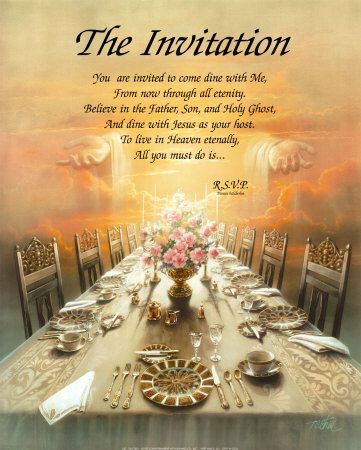 It seems like the theme of a lot of my teachings is COME – But that’s what the Father bids us to do! Jesus calls us to “Come” – He has made ready for us by His crucifixion and resurrection. Matt 25: 31-46 “When the Son of Man comes in his glory, and all the angels with him, then he will sit on his glorious throne. Before him will be gathered all the nations, and he will separate people one from another as a shepherd separates the sheep from the goats. And he will place the sheep on his right, but the goats on the left. Then the King will say to those on his right, ‘Come, you who are blessed by my Father, inherit the kingdomprepared for you from the foundation of the world. Matt: 11:28 Come to me, all who labor and are heavy laden, and I will give you rest. Is. 55: 1-13 “Come,everyone who thirsts, come to the waters; and he who has no money, come, buy and eat! Come, buy wine and milk without money and without price. Why do you spend your money for that which is not bread, and your labor for that which does not satisfy? Listen diligently to me, and eat what is good, and delight yourselves in rich food. Incline your ear, and come to me; hear, that your soul may live; So many times, I believe we settle for crumbs…we feel unworthy to even approach the table. We’ve accepted the invitation but we haven’t fully indulged in what the Father has prepared for us. When I host a dinner, I like to choose a meal that I know the person will enjoy…something they really like or maybe don’t get very often! God does that for us. He has chosen a menu for your life that is rich, full, and one that you cannot buy! It will fully satisfy! Let me compel you to scoot your chair closer to the table. Pick up your fork and take hold of FAITH and TRUST – completely…for therein are great blessings! Take up your knife and cut into the meat of His word. It is rich – it will fill you and satisfy every lonely and hurting heart. It will encourage you with promise! It’s totally something that you can sink your teeth into with confidence. Raise your chalice! It is full of the sweetness of His new wine! The new covenant! Join in the toast declaring, Our God Reigns! And a great banquet isn’t complete unless it has music! Let Him put a new song in your heart! Sing praises and worship Him for YOU are HIS special and honored guest! You have been invited to the great Love Feast. We have all of this now….. But oh the day, my friend! Are you excited?! The time is drawing near! I believe it is the evening hour --- at any moment God could lean over to Jesus and say… Everything is now ready, tell them to COME! And the door will be shut! Questions for Reflection: Do you feast at His real banquet now or are you simply hoping for one to come? Take a moment to self-examine if you are settling for crumbs or have you pulled your chair up to the table to enjoy the “love feast” set before you. Ask God to show you how He has prepared a great feast before you this very day! Awaiting that Great Day! Sherry Resources: Unger Bible Dictionary, Matthew Henry Commentary, Sally Clarkson, Charles Stanley, John Piper, Matt Heard, International Bible Dictionary, Tyndale’s, Commentary, GotQuestions.com, Grasping God’s Word – Duvall Hays NIV Cultural Backgrounds Study Bible, Scolfield, John MacArthur, Interlinear Greek-English, Strongs Concordance, Josephus Complete Works  If you are reading this blog through social media we would suggest that you sign up to recieve the blog each week in your email inbox. It will come directly to you to read at your leisure. Just enter your email in the subscriber box on the right at the top of this blog page on the website, then REPLY to the invitation email you will receive in your personal inbox. Your email address is safe with us! Follow ALL directions to completion! Feel free to share our blogs on your social media or email them to a friend.Just follow the instructions carefully Do you ever wonder if the sins of your past will always define you? Do you ever look at others and see the transformation in their lives and wonder how something so radical could have happened? Today our Monday Musings Devotional looks at a story most of us know from Sunday School. One of the things I love about studying the Word of God is that it is fresh for our lives every time we study it, because Jesus always meets us right at our point of need. There are so many great truths in this passage that I had never before considered. This year, in our Feast for Your Soul series, we have been studying the lessons that Jesus taught during feasts in the New Testament. Interestingly, Jesus invited himself to this feast! Take a moment and read the passage about Zacchaeus and Jesus from Luke 19:1-10.  He entered Jericho and was passing through. 2 And behold, there was a man named Zacchaeus. He was a chief tax collector and was rich. 3 And he was seeking to see who Jesus was, but on account of the crowd he could not, because he was small in stature. 4 So he ran on ahead and climbed up into a sycamore tree to see him, for he was about to pass that way. 5 And when Jesus came to the place, he looked up and said to him, “Zacchaeus, hurry and come down, for I must stay at your house today.” 6 So he hurried and came down and received him joyfully. 7 And when they saw it, they all grumbled, “He has gone in to be the guest of a man who is a sinner.” 8 And Zacchaeus stood and said to the Lord, “Behold, Lord, the half of my goods I give to the poor. And if I have defrauded anyone of anything, I restore it fourfold.” 9 And Jesus said to him, “Today salvation has come to this house, since he also is a son of Abraham. 10 For the Son of Man came to seek and to save the lost.” This is such a wonderful story in the gospels. To fully understand the story and cultural context, let me set the scene for you and give you a little background on tax collectors in the time of Jesus. Jericho was a beautiful, desirable place to live. It was famous for its palm trees, rose gardens and balsam groves. The name Jericho means “the perfumed." It was considered the Eden of Palestine, the fairy land of the Old World. This garden city of the ancient world was near the Jordan river, a popular resort for royalty and priests and was a busy center of trade and because of this Jericho was one of the most highly taxed towns in Israel. Tax collectors were despised for many reasons among the Jews. Israel was part of the Roman Empire. The Romans liked to squeeze as much money as possible out of the Jewish people. But the Romans didn’t collect the money themselves. Instead, they found a few greedy Jewish men to do the collecting for them. Zacchaeus was one of these tax collectors. The Scripture tells us that he was rich, a chief tax collector so he would have had others working for him. He would have been corrupt to the core, for Rome would set the tax but the collector could collect anything beyond that and keep it for himself. These men were considered scum, unclean, the lowest of the low, corrupt, rich, cruel and they were utterly despised. A tax collector like Zacchaeus was driven by the love of money. It was his sole motive, even if it cost him everything including friends, respect, and decency. Interestingly, the name Zacchaeus means innocent, pure, clean and righteous. His parents chose a beautiful name for him, but it is a name that he wasn’t living up to.  Zacchaeus probably knew of Jesus’ encounters with tax collectors. Jesus is on his way through Palestine, on His way to his death in Jerusalem. On His way we have this very unique and wonderful encounter with a little man named Zacchaeus. Jesus came to seek and save the lost. He came to rescue humanity devastated by sin. He came to rescue men like Zacchaeus. That word lost in the Greek means to be ruined, to be destroyed. To save in the Greek means to deliver from danger, save from His wrath and holy judgement. John MacArthur says, “Once God begins that seeking, once He opens our understanding to our own sinfulness, once He illuminates us as to the glory of the gospel, once He takes away the blindness and the darkness, once He gives life to our deadness, the awakened sinner, the enlightened lost one, the one who has been given life responds by seeking the one who sought Him.” We are only enabled to seek when God has first sought us. That's exactly what happens in the story of Zacchaeus. Out of nowhere Jesus seeks him and before it's over, his heart responds by seeking Jesus.” Let’s consider some of the beautiful faith lessons in this story. 1. Jesus sees, but not like we see. When Jesus sees Zacchaeus, He sees past the choices that he has made, past the sin, the failure, the hatred that others feel for him. He sees past the brokenness, the dishonesty, the greed and sees a man curious and in need of mercy. When the crowd saw Zacchaeus they saw a man who repulsed them. Jesus saw a man, crooked and broken who needed to be treated with dignity. Jesus saw a man who had sold his soul for money, a man empty and alone. Jesus saw a man ready for salvation, because he no longer wanted to live sinning against God and his own people. So Jesus invites himself to dinner and tells Zacchaeus that he is going to be his houseguest that very night. What Jesus sees isn’t dependent on public opinion. He sees into the depths of our hearts to our need, to our future, and to our potential. 2. To receive Christ in our hearts and homes requires humility. Zacchaeus had to humble himself to see Jesus. Imagine this wealthy, short, disliked man running through the crowd and climbing a tree so that he could see Jesus entering Jericho. He certainly wouldn’t have wanted to draw attention to himself in this crowd for he is despised by the Jews, but he risks it, runs, and climbs a tree so he can see the Savior. He is driven by something: curiosity, perhaps a sense of his own depravity, certainly a sense of a need for something or someone beyond himself. Zacchaeus wanted to see Jesus for himself. See who He really was, this One he had heard of who was a friend of tax collectors. I think we see from the humility that Zacchaeus displays that there must have been a deep knowledge of his own need for something outside of himself. 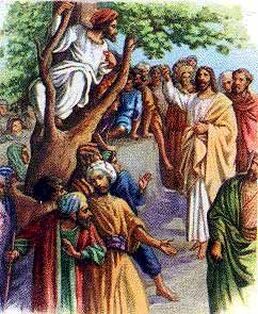 A desire for Jesus and a humble knowledge of our own deep need must be at the root of our spiritual life as well. 4 So he ran on ahead and climbed up into a sycamore tree to see him, for he was about to pass that way. 5 And when Jesus came to the place, he looked up and said to him, “Zacchaeus, hurry and come down, for I must stay at your house today.” 6 So he hurried and came down and received him joyfully. Other translations call it a sycamore fig tree, a mulberry fig tree. It’s a short stout tree with large leaves that Zacchaeus could have easily climbed, perhaps even hidden himself a bit among the leaves. I love that Jesus calls Zacchaeus by name, but we have no record of him ever meeting him before. Of course, in His sovereignty Jesus knows exactly who Zacchaeus is. 3. Jesus knows when, where and how you will be saved. He says, “Today I must stay at your house to spend the night.” It’s not a request, but is a divine command. Zacchaeus could have never anticipated this. He was considered unclean by the Jews, defiled, but Jesus wanted to see Zacchaeus, to meet with him, dine with him and stay the night. So in the next verse we are told that he hurried, comes down, and receives him gladly. The Lord reaches out to this one considered scum. Look at the response of the crowd in vs. 7 - And when they saw it, they all grumbled, “He has gone in to be the guest of a man who is a sinner.” Here we see the contrast in the heart of the Father and what we unfortunately often see in the heart of his people. To the Jews, Jesus is defiling himself to be the guest of such a man. To the Jew, to go to the house of Zacchaeus would be to partake of his crimes. But Jesus has a divine appointment with this man for salvation. Jesus came to save the sinner with nothing to commend themselves to Him. I love Spurgeon’s take on this part of the story. He says, “Next, I think it was a necessity of His sovereignty. “I must stay at your house.” Here were scribes, Pharisees, and all sorts of people around Him who were saying, “He is a prophet! He has opened a blind man’s eyes, and He must, therefore, as a prophet, be entertained by some notable Pharisee! Some very respectable person must find Him a lodging tonight.” But our Lord Jesus Christ seems to say, “I cannot be bound. I will not be fettered. I must exert My own will. I must display My sovereignty, and though these people will all murmur, I cannot help that. Zacchaeus, I will come and stay with you, just to show them that I will have mercy on whom I will have mercy, and I will have compassion on whom I will have compassion!” Jesus says to him, “Zacchaeus make haste.” And he does just that, he receives Jesus. Then the Scripture makes this dramatic jump when suddenly Zacchaeus wants to give away his possessions to the poor. It’s so interesting that we jump from Zacchaeus receiving Jesus into his house to the evidence of his transformation. John MacArthur, "Wow, something dramatic has just happened. Whoa! You've got a man who is a professional thief, extortionist who is now become an instant philanthropist. You've got a man who spent his whole life taking who now wants to give. You've got a man who is defined by selfishness now acting in an absolutely unselfish way. Something dramatic has happened here.” There is no discussion of his conversion, but we don’t need to know those details.We are not given the conviction of sin, repentance, or the conversion discussion in this passage. That is all throughout the gospels. The focus in this Scripture is the evidence of the salvation in the life of the new believer. McArthur says, “He is one of the lost which He seeks. It is true that he knows he has no eternal life, no relationship with God, no forgiveness of sin, bears a weight of guilt and all of its consequences. Jesus addresses that, talks to him about forgiveness, about repentance, about the kingdom, and he embraces it, by the power of God he embraces it. That's obvious. You say why? Because in verse 9 Jesus said to him, "Today salvation has come to this house.” Zacchaeus makes a dramatic leap to salvation. We see it in the evidence of his transformed life and from it there are more faith lessons for our own journey. 4. Jesus invites himself into our lives in the midst of our mess and sin. Jesus comes to Zacchaeus before he repents. He doesn’t wait for him to tidy up his life before he comes. It is His loving presence that brings repentance. Remember, Jesus is a pursuer of the lost. 5. Life in Jesus brings repentance and change. Because of his salvation, Zacchaeus makes a dramatic turn. Suddenly the heart that stole wants to generously give back. ”And Zacchaeus stopped and said to the Lord, 'Behold, Lord, half of my possessions I will give to the poor and if I have defrauded anyone of anything, I'll give back four times as much.’ Luke 19:8 6. Life in Jesus has the power to overcome our past. Surely Zacchaeus cried out in his inner man to experience fullness, completeness. He was rich, but unfulfilled, probably lonely and certainly despised. I would imagine that Zacchaeus had some experience with a crushed life. He was short, probably made fun of as a child and as an adult. We don’t know, of course, but something drove him to live the life he chose as a cheating, hated chief of tax collectors among his people. Something drove him to do anything for more money. But we see in this story the power of Jesus to overcome our past. 7. Life in Jesus brings healing, transformation and freedom. He is a transformed man. When you are saved, the past, the guilt is closed! Zacchaeus doesn’t hesitate or get bogged down in the failure of his past or let it excuse him from acting with generosity in his future. He freely gives. His chains are gone! The power of life in Jesus can overcome our natural tendencies and personalities that we are so quick to excuse. Zacchaeus had shown no evidence of kindness, generosity, righteousness, yet once saved with Jesus, he is generous and has a desire to be righteous. He is finally living up to his name! Because when he is saved, he can become a new creation in the Spirit of God. Suddenly the little man, despised, and insignificant in the eyes of the Jewish people was chosen and cherished by the Son of God! Jesus always reached out to those whom others saw as insignificant and unworthy. The result is a radically changed heart. Zacchaeus gave generously, not out of his leftovers. The presence of Jesus in our lives and His saving grace should move us to righteousness, generosity and holiness. Zacchaeus rises, takes a stand and confesses Jesus as Lord.  First he confesses Jesus as Lord and then he gives half of his possessions to the poor, and that’s a lot of possessions! It was radial evidence of the saving miracle in his life, a picture of denying yourself and following Christ. ”If any man will come after Me, let him deny himself, take up his cross daily and follow Me.” Luke 9:23. It’s really a stunning transformation. In one day Zacchaeus goes from being lost to being saved, from being a thief to being a benefactor, from being despised to being cherished! His transformation hits at the very core of the dominant sin in his life - money and greed. True righteousness results in true transformation. And this account of the salvation of Zacchaeus is such a beautiful display of that truth. It’s dramatic. One day, you’re a new creation! He turns from a greedy man to a generous, gracious giver. And Jesus said to him, “Today salvation has come to this house, since he also is a son of Abraham. For the Son of Man came to seek and to save the lost.” Jesus calls him a son of Abraham. He is already physically a son of Abraham as a Jew. He was a son by race, but now he was a son by faith through trust in Jesus Christ, the Son. Jesus came to seek and save the lost. To the people in that day, the middle Eastern mind, it was outrageous to include this man in the community of salvation. But for us, it is the most beautiful story of God’s redeeming love and grace and the amazing power it has to transform a life. We all need the Savior, because until you meet him, you too are a slave to sin, full of guilt, living in ignorance and darkness. This is a story of hope for all of us! Like Zacchaeus, “We need a prophet from God to come and tell us the truth. We need a priest of God to come and give us access to God. We need a King to come and guide, protect and provide. We need a Shepherd to come and feed and lead. The entire complex of man's needs points to the Lord Jesus Christ who makes men alive, who cleanses them, who frees them from sin, who gives them light, instruction, who is their prophet, priest, King, and Shepherd. He didn't come to demonstrate a noble ethic. He came to save people from their sin, from eternal hell, to bring them into His everlasting kingdom and heaven, to make them the possessors of everlasting life.” John MacArthur Jesus proclaims His mission in verse 10 - "For the Son of Man came to seek and to save the lost.” That was the consistent heart of His ministry on earth and today, always seeking out the outcast, the lowly, the ones ridden with sin and guilt. We are all like Zacchaeus in one way or another, with no righteousness of our own and in desperate need of the Savior. We all need Jesus, the Savior who gives us life, cleanses us with His blood and frees us from power of sin and the chains of darkness. Do you know Him as Savior? He is seeking you as well. You too can accept His invitation and receive Him joyfully! (Read Romans 3:23, 6:23, 5:8, 10:9-10, 10:13, 1 John 4:15, John 3:16) If you are saved it is because in love Jesus sought you and called you by name. There was also a divine appointment for your life when you were delivered and saved. Salvation is a gift. The evidence is how we now live and think when we are infused with the life of Christ. It’s good to acknowledge that change within us (and it’s ongoing) and thank the Father for it. Isn't it great to know that in Christ we aren't defined by our past for we can lean into the power of Jesus right now! Even if your story isn't as radical as Zacchaeus, you too can choose to live a dramatically transformed life. What is the evidence of the saving, transforming work of Jesus in your life? Take a few moments in prayer and thank the Father. Prayer Thank you that you sought me and saved me from my sin. Thank you Jesus that you are always the pursuer of the lost, the One who seeks and saves. Lord it is so easy for us to slip back into old sin patterns that you have shown us, so easy to get caught up in the desires of our flesh when you have done the redeeming work in our lives. It’s so easy to lose the fire of that first love, that radical transformation. Lord invade us with your presence and with a passion for you that will lead us to live our lives abandoned to your purpose for us, not counting the cost. Give us a holy affection for the things and people that you love. Let us never lose our passion for that miraculous transforming work within our souls until that day when we see you face to face. May we live generously with kindness and love so that the beautiful transforming work you have done in our lives is evident to all. And Lord, we lift up those today dear to us who don’t know you as Savior and Lord. Thank you that you see their need and you have the power to overcome the past, deliver and bring freedom! Lord, we ask this day by your Spirit you would remove the blindness from their eyes that they may behold you as Lord. In the saving name of Jesus, Amen Grateful for His saving grace and transforming work in my life, The Lord is my salvation! Kathy Resources: Teaching and writings by John MacArthur, Charles Spurgeon, Ken Gire, Sally Clarkson, Edersheim, photos Pinterest Surely this calls for a song of rejoicing - The Lord is my Salvation, by Keith and Kristyn Getty Join in the youtube video below and praise your Savior. The Lord is My Salvation by Keith and Kristyn Getty The grace of God has reached for me And pulled me from the raging sea And I am safe on this solid ground The Lord is my salvation I will not fear when darkness falls His strength will help me scale these walls I'll see the dawn of the rising sun The Lord is my salvation Who is like the Lord our God? Strong to save, faithful in love My debt is paid and the vict'ry won The Lord is my salvation My hope is hidden in the Lord He flow'rs each promise of His Word When winter fades I know spring will come The Lord is my salvation In times of waiting, times of need When I know loss, when I am weak I know His grace will renew these days The Lord is my salvation And when I reach my final day He will not leave me in the grave But I will rise He will call me home The Lord is my salvation Glory be to God the Father Glory be to God the Son Glory be to God the Spirit The Lord is our Salvation!  If you are reading this blog through social media we would suggest that you sign up to recieve the blog each week in your email inbox. It will come directly to you to read at your leisure. Just enter your email in the subscriber box on the right at the top of this blog page on the website, then REPLY to the invitation email you will receive in your personal inbox. Your email address is safe with us! Follow ALL directions to completion! Feel free to share our blogs on your social media or email them to a friend.Just follow the instructions carefully |
Sign Up to Receive our Blog via email.
Click to set custom HTML
Archives
July 2021
Categories |

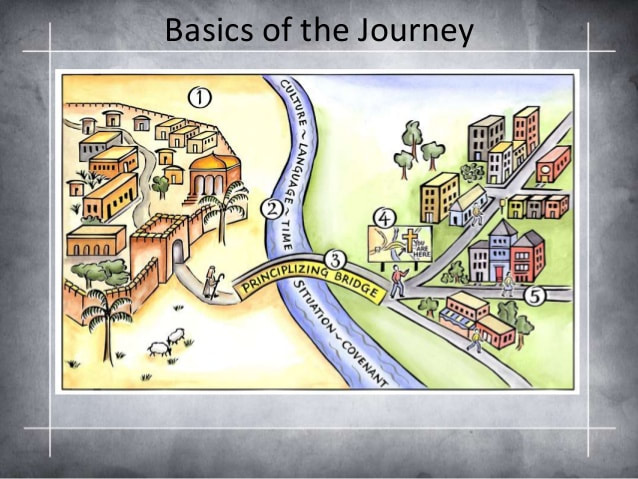

 RSS Feed
RSS Feed

